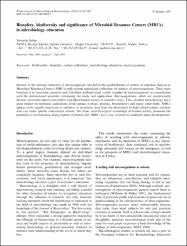Biosafety, biodiversity and significance of Microbial Resource Centers (MRCs) in microbiology education
Abstract
Interest in the intrinsic behavior of microorganisms has led to the establishment of centers of expertise, known as Microbial Resource Centers (MRCs) built around specialized collections of cultures of microorganisms. Their main function is to accession, preserve and distribute authenticated, viable samples of microorganisms in consultation with the international scientific community for study and application. Microorganisms, which are exceptionally diverse, are found almost everywhere and affect human society in countless ways. Thus, modern microbiology has a great impact on medicine, agriculture, food science, ecology, genetics, biochemistry and many other fields. MRCs appear to be equally important to industry, to academia, and from the elementary to high school science teachers who can order specific educational strains. The basic microbiological knowledge of human society possesses the potential to revolutionize many aspects of human life. MRCs are a key resource to underpin these developments.


















